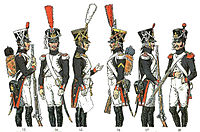The Grande Armée (French for "the Great Army" or "the Grand Army") first entered the annals of history when, in 1805, Napoleon I renamed the army that he had assembled on the French coast of the English Channel for the proposed invasion of Britain and re-deployed it East to commence the Campaign of 1805 against Austria and Russia.
Thereafter, the name was used for the principal French army deployed in the Campaigns of 1806-07, 1812, and 1813-14. In practice, however, the term "Grande Armée" is used in English to refer to all of the multinational forces gathered by Napoleon I in his campaigns of the early nineteenth century (see Napoleonic Wars).
The first Grande Armée consisted of six corps under the command of Napoleon's marshals and senior generals. When Napoleon discovered that Russian and Austrian armies were preparing to invade France in late 1805, the Grande Armée was quickly ordered across the Rhine into Southern Germany, leading to Napoleon's victories at Ulm and Austerlitz.
The army grew in size as Napoleon's might spread across Europe. It reached its maximum size of 600,000 men at the start of the invasion of Russia against the Sixth Coalition in 1812. All contingents were commanded by French generals, except for a Polish and an Austrian corps. The huge multinational army marched slowly eastwards, with the Russians falling back before it. After the capture of Smolensk and victory in the Battle of Borodino, Napoleon and a large part of the Grande Armée reached Moscow on 14 September 1812; however, the army was already drastically reduced in numbers due to bloody battles with Russians, disease (principally typhus) and long communication lines. The army spent a month in Moscow, but was ultimately forced to march back westwards. Assailed by cold, starvation and disease, and constantly harassed by Cossacks and Russian irregulars, the retreat utterly destroyed the Grande Armée as a fighting force. As many as 400,000 died in the adventure and only a few tens of thousands of ravaged troops returned.
Napoleon led a new army to the Battle of Nations at Leipzig in 1813, in the furious defence of France in 1814, and in the Waterloo campaign in 1815, but the Napoleonic French army would never regain the heights of the Grande Armée in June 1812.
